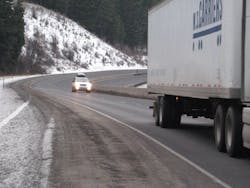It’s a common cry heard around the country. As infrastructure deteriorates nationwide, states are finding it more and more difficult to maintain their roads and fund transportation projects.
The problem is that the fuel tax returns states have come to rely on to fund these projects are beginning to diminish as cars have grown more fuel efficient. And by 2025, federal vehicle fuel-efficiency standards will require that automobiles are even more efficient – averaging 54.5 miles per gallon.
One state believes it has the solution – and it doesn’t involve increasing the federal gas tax, which hasn’t been raised since 1993. Oregon will be testing a road usage charge system that it feels is a “fair, reliable way” to generate transportation revenue. On July 1, the Oregon Dept. of Transportation (ODOT) will begin assessing a charge of 1.5 cents per mile for 5,000 drivers of cars and light commercial vehicles who have volunteered for the state’s road usage charge program – OReGO.
This will be the first phase of a volunteer-based program, which tests three different methods of collecting mileage-based fees. According to ODOT, participants will not be obligated to pay both the gas tax and mileage-based fees, and they will receive a credit to offset the fuel tax they pay at the pump.
“The states have to come up with some kind of solution because we can’t let the roads fall apart,” said Michelle Godfrey, the public information officer for ODOT’s Road Usage Charge Program. “We’re making so many strong and good efforts making our transition from fossil fuels, yet our transportation funding is dependent on the sale of gas. This is the way to do it. This is a fair and sustainable way. You basically pay for what you use.”
Those interested in participating in the program, can sign up at myorego.org, where they will choose one of three vendors to manage their mileage reporting and payment/credits. The vendors selected – Verizon Telematics, Azuga and Sanef – have all been certified by ODOT, Godfrey said.
The road usage charge system will automatically collect mileage data from participating vehicles, and a mileage reporting device selected by the motorist will interface with the vehicle and be paired with software to send mileage totals to the chosen account manager. The on-board mileage reporting device may be either basic, which does not use location-determination technology, or advanced, which uses location-determination technology.
Godfrey said the state has been studying this type of system for the past 12 years. The program follows previous smaller pilot projects in 2007 and 2012 to test mileage-based fee systems in the state. After those tests, citizens raised concerns that the government could track them via GPS technology. From that, Godfrey said the state learned that it had to offer a non-GPS option.
Godfrey said other states, which are studying mileage-based user fees, are looking to see how the program works in Oregon. According to data released by the Mileage-Based User Fee Alliance, other states are also studying this type of system. According to the alliance, the Minnesota DOT tested a road usage charging system in 2011-12; Nevada has conducted its own studies of mileage-based fees; California passed legislation in 2014 requiring the transportation commission to establish a task force to study the system; in 2012, Washington authorized the transportation commission to form a committee tasked with evaluating the feasibility of this type of system; and other states have formed coalitions and are exploring mileage-based user fees.
“This is a much bigger scale and our last chance to see if this could work for potential expansion of the program down the road,” Godfrey said of OReGO. “We are hoping that people will sign up and that Oregonians will find this is an acceptable alternative to the gas tax.”
“This is one solution,” she continued. “And we think it’s the best.”
Not everyone, however, believes this system is the answer.
The American Trucking Associations (ATA) said it has concerns about evasion and privacy. In addition, it believes that this type of vehicle miles traveled (VMT) system shouldn’t apply to trucks.
"We have issues with tolls and other VMT fees that will potentially push vehicles off the interstate and onto secondary roads, which are less safe and not constructed as well,” said Darrin Roth, vice president of highway policy. “We have significant concerns about evasion, privacy and a lot of other issues that haven’t been worked out.”
Both Roth and the ATA’s vice president of state laws, Bob Pitcher, said a fuel tax increase is the preferred option – at least for the next 15 to 20 years.
“When we have more electric vehicles, then we will have to come up with some new fee,” Roth said. “But that time is very far off, especially for trucks. It’s hard to come up with a new system that doesn’t involve diesel or natural gas that’s practical.”
Pitcher also said the ATA is concerned about the multiple layers of taxation this can impose.
“In order to really determine what distance a vehicle travels, you have to know where the vehicle went,” he said. “If there is no follow-up, there will be mass evasion. We think the system underestimates how much trouble an individual will go through to not pay a tax.”
Overall, the ATA maintains that there are few cars – and even fewer trucks – on the roads that don’t use taxable fuel.
“If you’re going to do VMTs, do it for cars, not trucks,” Roth said. “Because we aren’t the issue.”
About the Author

Cristina Commendatore
Cristina Commendatore is a past FleetOwner editor-in-chief. She wrote for the publication from 2015 to 2023.
